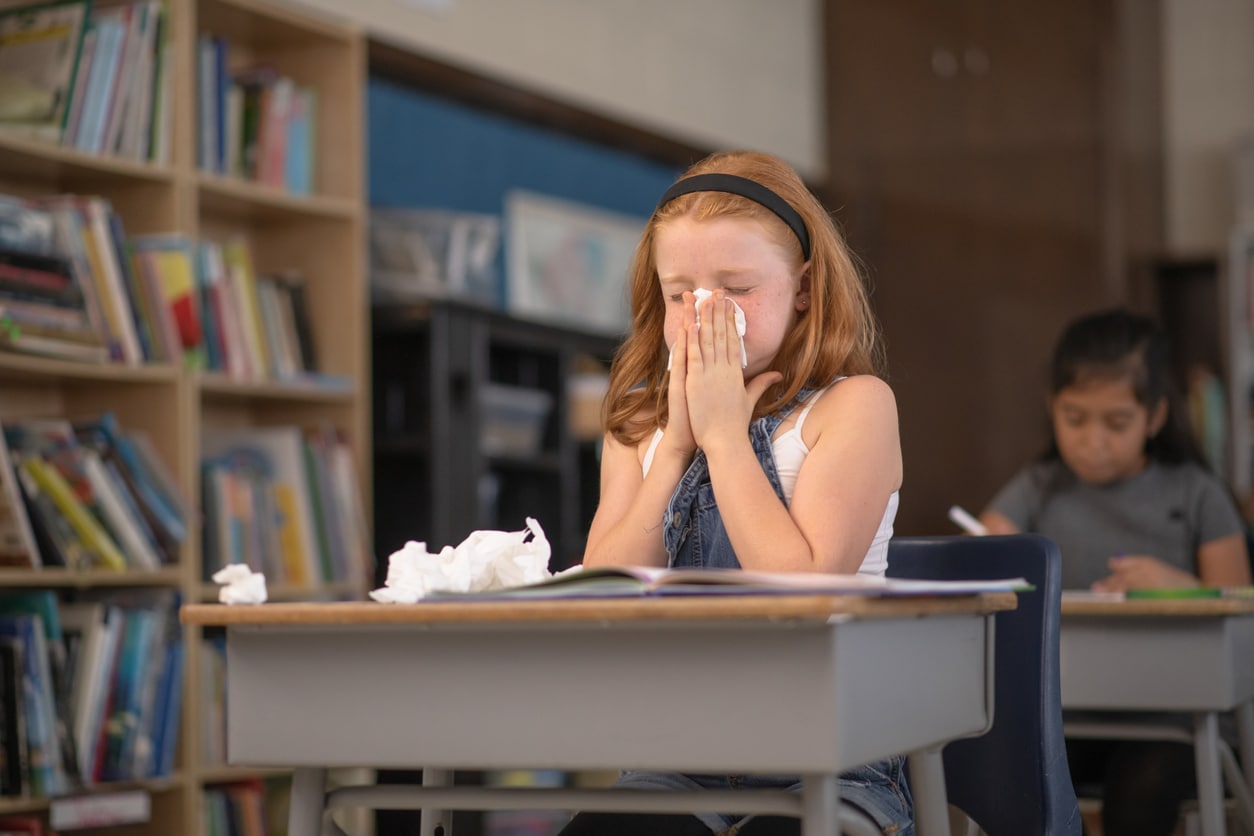As the new school year approaches, parents of children with allergies may face a unique set of challenges. Returning to school can be an exciting time for kids, but it can also expose them to various environmental allergens that can trigger uncomfortable allergy symptoms such as sneezing and coughing. Nearly one in four children have a seasonal allergy; here are some practical tips to help your child manage allergies as they return to the classroom, starting with how to determine what allergies to be aware of.
Identify Common Environmental Allergens

Schools are filled with potential allergens that can affect your child. Some of the most common environmental allergens that may differ from home to school include:
- Pollen: Different trees, grasses and weeds at schools like Auburn Elementary and others can release pollen into the air. It’s also worth noting school begins near the start of autumn, which can expose children to fall allergens they didn’t have exposure to during summer break.
- Dust mites: Dust mites thrive in warm, humid environments and can be found in carpets, upholstery and other surfaces.
- Mold: Mold spores can be present in damp areas such as bathrooms, locker rooms, basements and even on plants.
- Classroom supplies/Other students’ supplies: Some children may be allergic to materials used in classrooms, such as chalk dust or certain art supplies. Additionally, other students may have pets at home and carry pet dander to school on their backpacks or clothing.
Communicate with the School
Effective communication with your child’s school is a great first step toward alleviating allergy symptoms for your child once the school year begins. Start by scheduling a meeting with your child’s teacher, school nurse or any other relevant staff members. Here’s what to discuss:
- Allergy action plan: Provide the school with a detailed allergy action plan outlining your child’s specific allergies, symptoms and necessary management options. Ensure they know how to administer any medications, such as antihistamines or inhalers.
- Medications: Make sure the school has up-to-date medications for your child and that staff are trained to use them.
- Seating arrangements: Discuss seating arrangements that minimize exposure to allergens, such as keeping your child away from windows during high pollen seasons or away from dusty or moldy areas, class pets or certain plants.
- Cleaning protocols: Ask about the school’s cleaning protocols and suggest additional measures if necessary, such as using air purifiers in classrooms.
Prepare Your Child
There are also steps you can take at home to prepare your child for the school year. Empowering your child with knowledge about their allergies and how to manage them is essential and not just the school’s responsibility. Here are some steps to take:
- Educate: Teach your child about their specific allergens and what symptoms to look out for. Explain the importance of avoiding known triggers and following their allergy action plan.
- Self-advocacy: Encourage your child to speak up about their allergies. They should feel comfortable informing teachers and friends about their condition and asking for help if needed.
- Hygiene practices: Reinforce good hygiene practices, such as washing hands regularly and avoiding touching their face, to reduce the risk of allergen exposure. Regularly wash frequently worn items like jackets. If allergy symptoms are particularly bad after a school day, encourage your child to take a shower or bath once they get home.
- Personal supplies: Provide your child with personal supplies, such as allergen-free wipes and hand sanitizers, to help them manage their environment. Ensure your child stays on a consistent medication routine, if recommended by the doctor.
If your child experiences allergy symptoms that disrupt their comfort at school, it’s important to see an ENT. The doctor can help create an allergy management plan to ensure a successful school year and help comfortably manage your child’s symptoms.
To learn more about allergy management tactics for you or your child, contact Willamette ENT & Facial Plastic Surgery to schedule a consultation today.
“I came to be under Dr. Donovan's care during a medical emergency at the hospital. The care I received that day and in every interaction after, at Willamette ENT has been prompt, professional and very thorough. I feel very well cared for.”